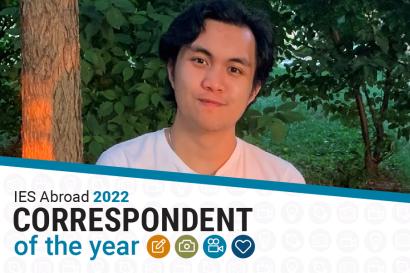There’s been a lot to my first week in Berlin. For instance, when the IES Abroad staff took us to an O2 outlet on Friedrichstraße for German SIM-cards, one of the employees nodded towards our group of confused, tired, and mildly hungry American students. He pleasantly reminded us that they would be able to speak to us in English, politely gesturing us to enter the building.
Plopping myself down at the service desk, though, I impulsively chirped in German when handing the man my passport, dooming myself to an attempt at conversing in a foreign language. “Hier ist mein Ausweis.” Here’s my identification. The man handled it with care, rifling through it until he found the page with my information.
As he looked it over, I summoned the best of my rusty German and added, “Manche von uns Deustch verstehen, aber nicht alle.” Most of us understand German, but not all.
Continuing his pleasant tone, the O2 worker replied, “Ja, aber Sie sprechen gutes Deutsch.” Yes, but you speak good German.
“Wirklich?” I conceded, “Also, ist Deutsch meine dritte Sprache, so, es ist manchmal nicht so gross.”
Really? Uhm, German’s my third language, so, it’s not always so great.
“Dritte Sprache? Welche andere Sprachen kennen Sie?” Third? What others do you know?
“Natürlich Englisch. Aber auch Tagalog, eine Sprache von der Philippinen.” Of course, I speak English. But also Tagalog. It’s a language from the Philippines.
“Von der Philippinen?” He furrowed a brow. The Philippines?
“Ja, genau. Meine Familie kommt aus der Philippinen.” Yeah, exactly. My family’s from there.
He smiled under his mask, handing me a digital form on a tablet for me to sign. As I hastily scribbled my name in cursive, I noticed the flag of Russia sitting next to the Union Jack on his name card, his surname above noticeably coming from somewhere east of Berlin.
As this interaction easily demonstrates, Berlin has made itself apparent as being an international city—a true Weltstadt. The kids on the street praise each other’s style with "no front", show their gratitude for life with a “mashallah”, and are equally likely to bid one another farewell with a “tschüs”, “ciao”, or a “see ya.” This is in part the result of many, many waves of immigration to the area over a period of many, many years.
For example, Berlin holds what’s cited as the largest Turkish population existing outside of Turkey. The community finds its roots in the employment of Turkish “Gastarbeiter”, or “guest workers”, workers from outside of Germany who were systematically recruited to fill the labour shortage during the nation’s era of reconstruction. Their children became educated in German schools, forming a generation with cultural ties to both their parent’s country of origin and their country of birth.
Turkish German culture continues to permeate the city, most apparent in the form of the ever-popular Döner. Döner kebab, a dish of Turkish origin, often takes the form of a sandwich in Germany, with Döner-dedicated stalls available on almost every other block in Berlin. This localized incarnation is an undeniable fusion of influences, rotisserie meats paired with salad and sauce(s) one is obligated to request in German.
Truth be told, my parents actually came to the United States during a labour shortage. In the wake of the first years of the American AIDS epidemic, New York found itself desperately searching for qualified medical workers to fill roles in many hospitals founded during the 1980s. English having been their language of education, and, quite frankly, underpaid in the country of origin, Philippine nurses were incredibly suited for these positions. My mother was one of these many nurses, first settling in the East Village of New York in 1987. Her husband then also immigrating, and her children born as Americans by birthright, she joined the ever-growing Filipino American community of the East Coast.
That being so, there’s a sense of familiarity for me in Berlin’s ethnic enclaves—in their residents dipping in-between languages, lands, and loyalties, and in these communities’ children crafting an identity neither here nor there.
There’s a lot of other stuff that’s happened to me in Berlin since getting here—figuring out how to navigate the city in spite of a S-Bahn worker strike, growing my German vocab, journeying with fellow students to explore the city’s vibrant nightlife, befriending both locals and other international students, and most definitely, eating a lot of Döner since moving in.
But getting not just familiar, but comfortable with Berlin, has probably been the biggest thing I’ve done so far. And I’m sure it can only get better from here.

Avery Trinidad
Hey there! I'm Avery Trinidad, a junior majoring in Sociology and concentrating in Global Studies over at Williams College! I think long walks by the beach are an unironic fun time, have made a hobby of writing songs with ukulele accompaniment, and have an apparent talent for making eggs. I'm a big ol' New York native, with a booming voice and headstrong attitude to boot. Though born and raised in Manhattan, I've had the opportunity to take German as a third language since my freshman year of high school. I'm looking forward to documenting my experiences in Berlin, especially after it emerges from such a tumultuous time in not only its own history, but the world's! Bis bald!









